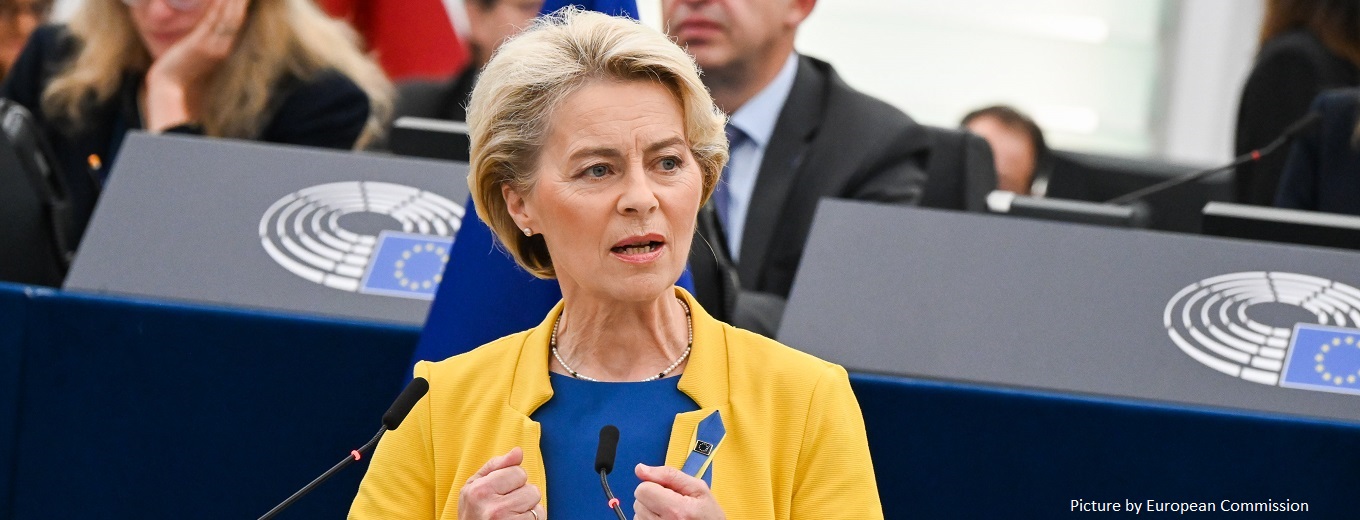Ursula Von der Leyen announces new instruments, like a European Hydrogen Bank, to accelerate the green transition. She proposes to make 2023 the Year of Skills.
During her annual State of the European Union address on 14 September, the President of the European Commission (EC), Ursula von der Leyen, took stock of achievements during the past year and outlined the EC’s priorities for the future. Her speech focused on the Russian invasion of Ukraine and Europe’s solidarity with Ukraine. She made the point that the energy supply challenges caused by the war call for decisive action, especially when it comes to the use of hydrogen, as envisioned in the Commission’s REPower EU plan from May (see SwissCore article): “To achieve this, we must create a market maker for hydrogen, in order to bridge the investment gap and connect future supply and demand. That is why I can today announce that we will create a new European Hydrogen Bank.” It is foreseen that the new Hydrogen Bank will use resources from the Innovation Fund (see SwissCore article) to support building the market for hydrogen (see also SwissCore article).
The EC President mentioned additional new initiatives in the area of education, research and innovation. She proposed to make 2023 the European Year of Skills. “We need much more focus in our investment in professional education and upskilling.” Von der Leyen called for steps to attract more skilled people to Europe. The EU should facilitate the recognition of qualifications also of third country nationals. She hopes that this set of measures related to education and training will help create the skilled workforce needed to drive the green and the digital transitions and that the right skills mix will support the EU’s recovery from the pandemic and increase the bloc’s competitiveness. Also related to the EU’s competitiveness, von der Leyen announced a European Critical Raw Materials Act that should help Europe securing supplies for rare earths and lithium that are needed to scale up the use of new technologies. She referred to the positive experience of the Battery Alliance launched in 2017, which will soon ensure that two thirds of batteries needed in Europe will be produced in the EU. Von der Leyen hopes for similar success in the case of the Chips Act that she announced in 2021 and that is now in the legislative process (see SwissCore article). To strengthen the EU’s industrial strategy, to “make sure that the future of industry is made in Europe”, von der Leyen announced an increase in the EU’s financial participation in Important Projects of Common European Interest (IPCEI). She would like to go even further: “And for the future, I will push to create a new European Sovereignty Fund.”
Notable for third countries, von der Leyen sees a “need to reach out to the countries of Europe – beyond the accession process”, referring to the idea of a ‘European Political Community’, launched on Europe Day last 9 May by French President Macron: “I support the call for a European Political Community – and we will set out our ideas to the European Council”. When looking back to the past year, the EC President touched on the topic of tackling foreign interference in academia, which recently became a topic at the European level that mirrors the current geopolitical environment. She vowed to tackle interference by autocrats, whose “disinformation is spreading from the internet to the halls of our universities”. Von der Leyen thinks that “many of us have taken democracy for granted for too long” – and added “today we all see that we must fight for our democracies. Every single day.”
While EC President von der Leyen announced new initiatives, the discussion about the EU’s budget for 2023 shows that new proposals can face financial limits. The EC budget proposal for 2023 from June foresees €12.3 billion for Horizon Europe and €3.5 billion for Erasmus+ (see SwissCore article). While the European Parliament opposes diverting Horizon Europe funding away to new initiatives, such as the Chips Act, this is nonetheless the approach supported by Council. The EP favours the principle that new initiatives should receive their own dedicated budget. The Council calls for cuts of -€663.2 million for Horizon Europe commitment appropriations and formally adopted its position on the draft general budget for 2023 on 6 September. This will serve as a mandate for the Czech presidency to negotiate the budget with the EP this autumn. The EP demands a reversal of the cuts proposed by the Council and will vote in October on its position for the upcoming budgetary negotiations. The position of the EP is supported by voices from the R&I community, like EARTO and European university associations (see ScienceBusiness article).
September saw some progress on association to EU programmes – in the case of Ukraine. In early September, Ukraine became associated to the Digital Europe Programme, after having joined Horizon Europe already in June 2022. On 9 September, the Council authorised the EC to open negotiations with Canada and New Zealand on their association to Horizon Europe. Meanwhile, there is still no progress for Switzerland and the United Kingdom to become part of the programme. In mid-August, the UK formally triggered the mechanism for consultations under the UK-EU Trade and Cooperation Agreement in an attempt to resolve the still outstanding finalisation of the UK’s association. However, the consultations that took place on 22 September in the UK-EU Specialised Committee on Participation in Union Programmes brought no progress, the EU continues to decline the UK’s request to finalise association. The UK has now the options to ask for an arbitration process with the EU that would last into early 2023 – or to consider other options, including setting up its own alternative to Horizon Europe instruments. The government has not decided yet: “The UK government is now urgently considering next steps. Our priority is to support the UK’s world leading R&D sector and we have already outlined potential options for doing so.”

